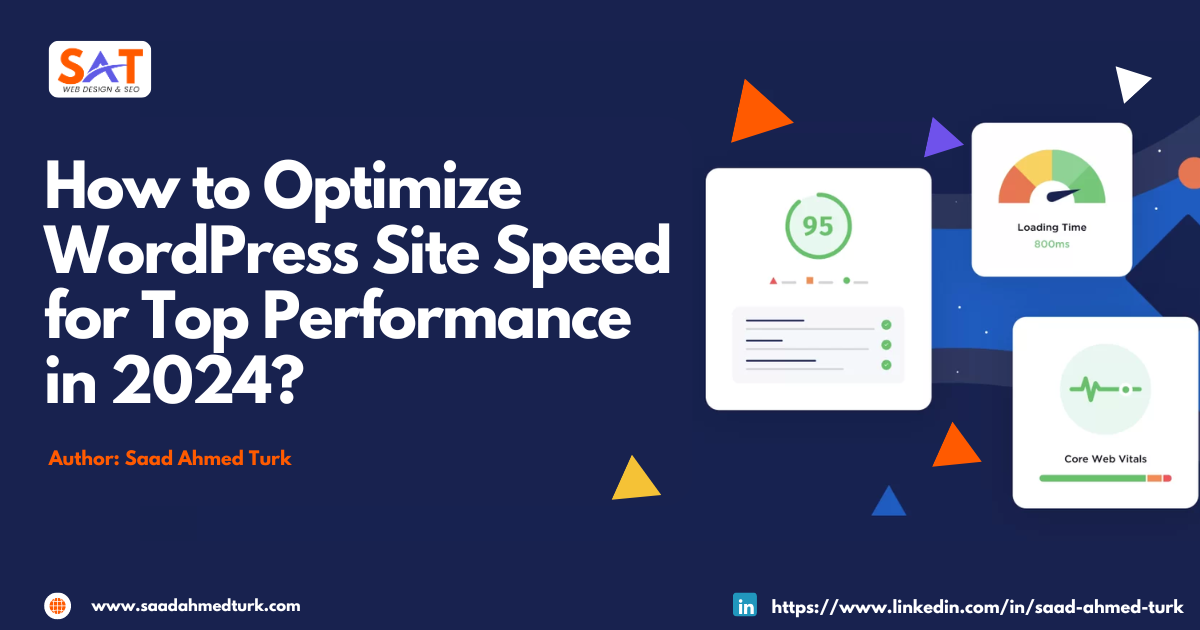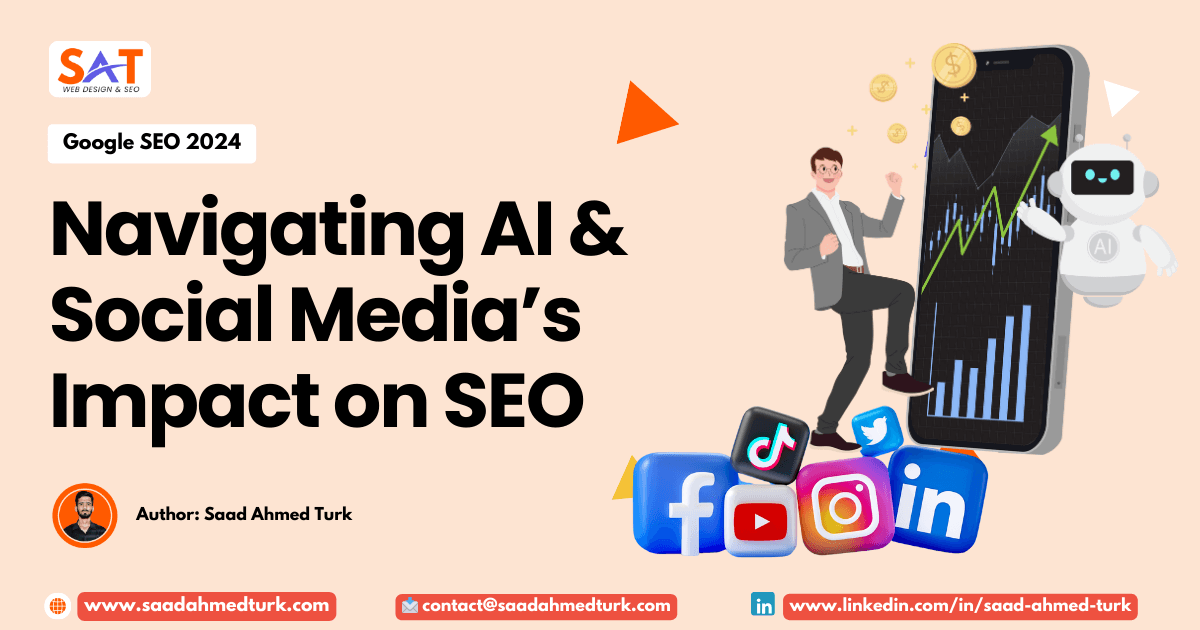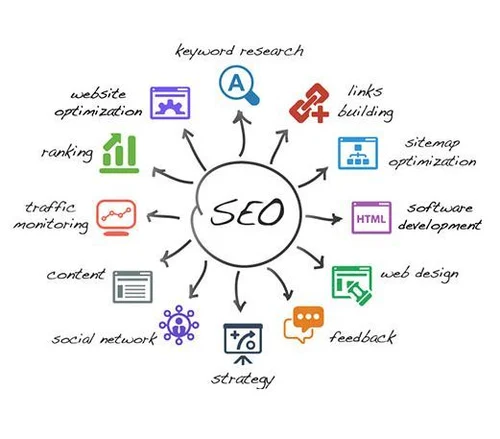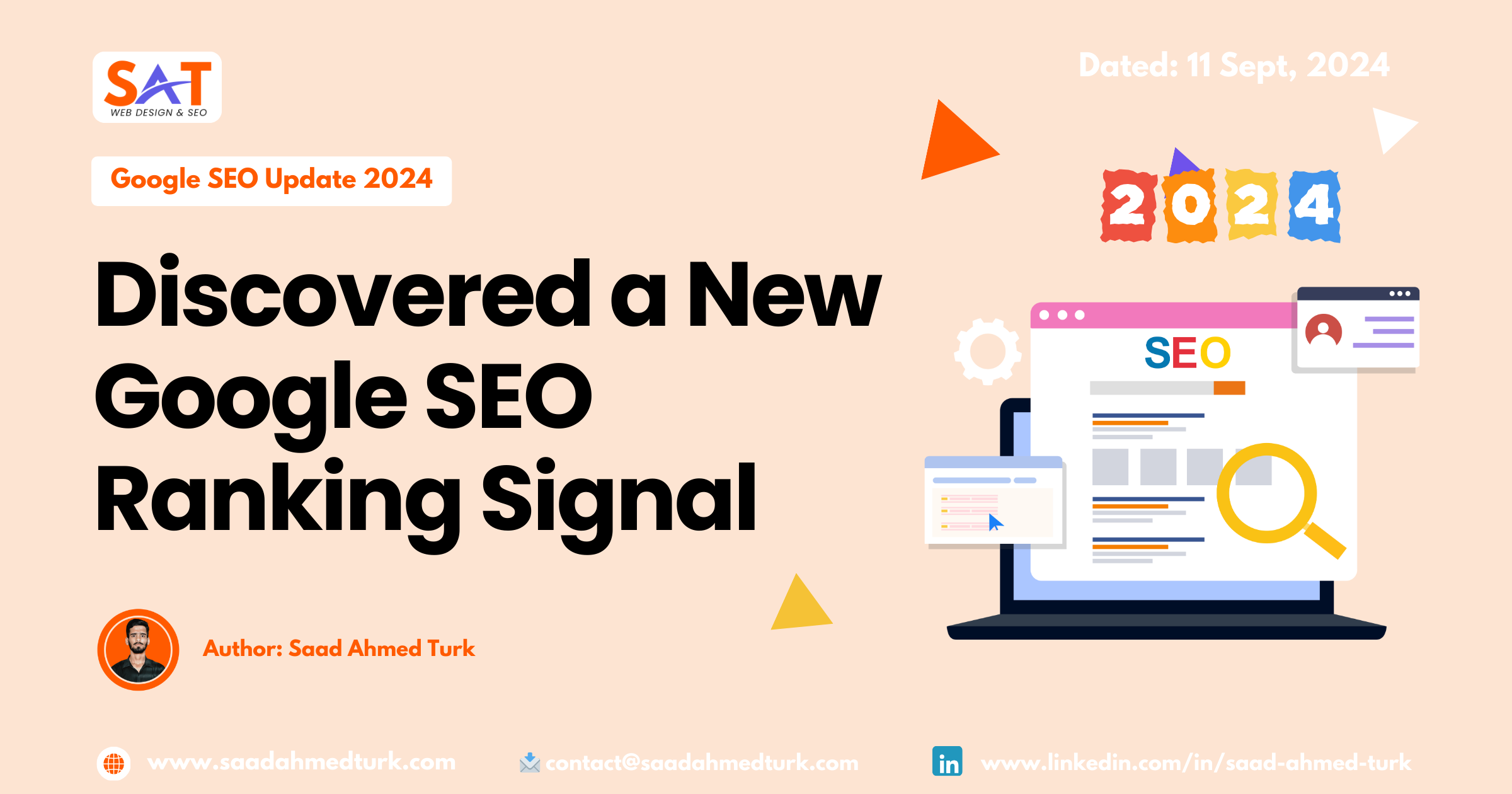
In the fast-paced digital world of 2024, website speed is more critical than ever. Discover actionable insights and advanced strategies...
Healthcare SEO Expert – Saad Ahmed Turk
Discover how AI and social media are reshaping the SEO landscape in 2025, and learn why evolving your SEO strategy is essential for success. This article provides actionable insights to enhance online visibility, improve brand authority, and stay ahead of competitors in a rapidly changing digital world. Gain practical steps to future-proof your SEO efforts and drive sustainable growth in today’s fast-paced environment.
In today’s fast-paced digital world, SEO is no longer a static set of rules but a dynamic strategy that evolves constantly. With the rapid advancements in AI and the explosive growth of social media, traditional SEO practices are undergoing a significant transformation.
To stay ahead, businesses must shift their focus toward enhancing online visibility and solidifying their brand presence.
This article delves into the changing face of SEO, the role of AI and social media, and how you can adapt your strategies to thrive in this new era.

SEO has dramatically transformed over the years, shifting from a keyword-heavy approach to one that focuses on user experience, relevance, and quality. In the early days, strategies like keyword stuffing and accumulating as many backlinks as possible could often boost a site’s ranking.
However, search engines have become far more sophisticated, especially with the integration of AI, and these outdated techniques no longer provide lasting results.
Today’s SEO is about creating meaningful, relevant content that answers user queries while aligning with search engine algorithms. AI has played a pivotal role in enhancing this evolution.
Search engines, like Google, are now able to analyze content more intelligently, understanding user intent and offering results that match not just keywords but the context of a search query.
Additionally, social media has redefined content discovery. Platforms like Instagram, Twitter, and TikTok have turned into search tools themselves, providing users with real-time insights and shaping the way content is shared and consumed.
As AI and social media continue to evolve, businesses and marketers need to adapt their SEO strategies to stay competitive. It’s no longer just about ranking for the right keywords, but about delivering a user-first experience, ensuring that your content is discoverable, engaging, and valuable across multiple platforms.

Artificial Intelligence (AI) has become a game-changer in the world of SEO, bringing advanced capabilities that revolutionize how search engines interpret and rank content. AI’s role in modern SEO extends beyond simple algorithm enhancements; it fundamentally reshapes how we approach content creation, optimization, and user engagement.
AI has made search algorithms significantly more sophisticated. Unlike traditional algorithms that relied heavily on keyword matching, AI-driven algorithms understand the context and intent behind user queries.
This means search engines can deliver more relevant results based on the meaning of the content rather than just specific keywords. AI-powered algorithms like Google’s BERT and RankBrain interpret natural language more effectively, improving the accuracy of search results and ensuring that users find the most relevant content.
AI tools offer powerful predictive analytics that help SEO professionals anticipate trends and user behavior. By analyzing large datasets, AI can identify patterns and predict future search trends.
This enables marketers to tailor their strategies proactively, optimizing content to align with emerging topics and user interests before they become mainstream.
AI can streamline content creation through tools that generate and optimize text based on predefined parameters. While human touch is still crucial for high-quality content, AI-powered tools assist in generating ideas, improving readability, and ensuring that content aligns with SEO best practices.
These tools can analyze top-performing content in your niche and provide actionable insights for creating content that meets SEO standards.
AI enhances user experience by personalizing search results and recommendations. Machine learning algorithms analyze user behavior to deliver content that matches individual preferences and interests.
This personalized approach not only boosts user satisfaction but also encourages longer site visits and higher engagement rates, which are crucial factors for SEO success.
AI-driven SEO audit tools offer comprehensive analysis and actionable insights with greater accuracy. These tools can identify issues related to site performance, keyword usage, and technical SEO elements, providing detailed reports that help optimize your website more effectively.
By leveraging AI, SEO professionals can focus on strategic improvements rather than getting bogged down by manual checks.
In essence, AI is reshaping the SEO landscape by making it more intuitive, data-driven, and user-centric. As AI technology continues to advance, it will undoubtedly unlock new opportunities for enhancing SEO strategies and achieving greater online visibility.

In the interconnected world of digital marketing, the relationship between social media and SEO is increasingly significant. While social media signals don’t directly influence search engine rankings, the interaction between these platforms and SEO strategies can greatly enhance online visibility.
By understanding and leveraging this relationship, you can optimize your overall digital marketing approach for better results.
Social media platforms are crucial for amplifying the reach of your content. When users share your blog posts, articles, or other forms of content on social media, it extends its reach far beyond your existing audience. This increased exposure can drive substantial traffic to your website, indirectly influencing your SEO performance.
Search engines recognize the value of high-traffic websites and may reward them with better rankings. For instance, if a well-crafted post about your latest product goes viral on Facebook or LinkedIn, it can lead to a surge in website visits, signaling to search engines that your content is highly engaging and relevant.
A strong social media presence contributes to building brand authority and credibility. Engaging actively with your audience on platforms like Twitter, Instagram, and LinkedIn helps establish your brand as an authority in your field.
While social signals themselves aren’t a ranking factor, a well-regarded brand often earns backlinks from reputable sites and media coverage. These backlinks are crucial for SEO as they indicate to search engines that your website is trustworthy and authoritative.
For example, a thought leader in your industry who frequently shares insights on social media is likely to attract mentions and links from other industry experts and media outlets.
Social media allows for direct interaction with your audience, which can lead to higher engagement rates. This engagement includes likes, shares, comments, and follows, all of which contribute to a more robust online presence.
Higher user engagement on your website, such as longer session durations and lower bounce rates, is a positive signal to search engines. When users find your content valuable and engaging, they are more likely to spend time on your site and explore further.
For instance, interactive content such as quizzes or polls shared on social media can drive users to your site, where they might engage with additional content and services.
For businesses focusing on local markets, social media is a powerful tool for enhancing local SEO. Platforms like Facebook and Instagram offer location-based features that help you connect with local audiences. By regularly posting about local events, promotions, or community involvement, you can increase your visibility among local users.
This local engagement can improve your chances of appearing in local search results, especially when combined with accurate and consistent business information on your social media profiles and local directories.
Social media platforms provide valuable insights into user behavior and preferences. Analyzing metrics such as engagement rates, click-through rates, and demographic information can inform your SEO strategy.
For instance, if you notice a high level of engagement with content related to a specific topic or keyword, you can adjust your SEO efforts to focus more on that topic.
Additionally, social media insights can help you understand which types of content resonate most with your audience, allowing you to create more targeted and effective SEO content.
To maximize the impact of social media on SEO, it’s essential to integrate social media efforts with your SEO strategy. Coordinate content marketing campaigns across social media and your website to ensure consistency and reinforce key messages.
Promote your SEO-optimized content on social media to drive traffic and engagement, and use social media channels to gather feedback and insights that can refine your SEO approach.
By strategically leveraging social media, you can enhance your SEO efforts and improve your overall online visibility. While social media doesn’t directly affect search engine rankings, its role in amplifying content reach, building brand authority, and engaging users creates a synergistic effect that supports and strengthens your SEO strategy.
Integrating social media and SEO efforts will ensure a more comprehensive and effective approach to digital marketing.

In today’s fast-paced digital world, SEO can’t just be a set-it-and-forget-it strategy. The constant evolution of AI, social media, and search engine algorithms means your SEO efforts need to be adaptable. But how exactly can you stay ahead of these changes?
Search engine algorithms are constantly changing, and these updates can have a major impact on how your website ranks. Keeping up-to-date with these changes is crucial to ensure your SEO strategies stay effective.
Following industry news, joining SEO communities, and regularly checking SEO analytics tools can keep you in the loop. It’s all about being proactive, this way, you can adapt your strategies before any algorithm changes start affecting your rankings.
Understanding how your content is performing is a core part of an adaptive SEO approach. Tools like Google Analytics or SEMrush allow you to track key metrics such as organic traffic, bounce rates, and conversion rates.
If you notice a dip in traffic or engagement, it’s a sign that adjustments may be necessary. On the other hand, spikes in performance might show that you’re on the right track, letting you double down on what’s working.
As technology evolves, so must your SEO strategies. With the rise of voice search and AI-powered assistants like Siri or Google Assistant, optimizing for voice search is becoming increasingly important. Plus, mobile-first indexing means that your site needs to be fully optimized for mobile users. In today’s world, a seamless mobile experience can make all the difference to your ranking and user engagement.
An adaptive SEO approach is one that’s always evolving, and that means testing is essential. Running A/B tests on headlines, meta descriptions, and even page layouts can reveal what resonates most with your audience.
The best part? When you continuously test and tweak, you’re always improving. And in a competitive SEO landscape, those small adjustments can make a big difference over time.
Shifting to a more advanced SEO strategy, especially one that leverages AI and social media, requires a thoughtful and well-structured approach.
Let’s break down the practical steps to help you implement this transformation smoothly.
Before diving into any changes, start by evaluating your existing SEO efforts. Take a close look at what’s working and where there’s room for improvement. Are you ranking well for your target keywords? Is your site’s speed and mobile performance optimized? This audit will give you a baseline to work from, ensuring you’re not just guessing but making informed decisions.
Actionable Tip:
Utilize tools like Google Search Console and SEMrush to analyze keyword performance, site traffic, and technical issues that may be holding your site’s performance.
The next step in transforming your SEO strategy is integrating AI-powered tools. These tools can help you streamline time-consuming tasks such as keyword research, content optimization, and data analysis.
AI tools can analyze trends and user behavior patterns faster than traditional methods, offering insights that can shape more effective strategies.
Actionable Tip: Tools like Clearscope or SurferSEO are great for optimizing content in line with AI-driven search engine expectations. They’ll help you pinpoint opportunities for ranking higher on specific topics.
A strong social media presence isn’t just about brand visibility, it directly impacts your SEO. Social platforms can drive traffic to your site, increase content engagement, and improve your overall domain authority. To capitalize on this, focus on creating engaging and shareable content that resonates with your audience.
Actionable Tip:
Post regularly on platforms that align with your audience and industry. Also, encourage user-generated content and social sharing to amplify reach.
No SEO strategy is complete without ongoing monitoring. Once your new SEO efforts are in place, keep a close eye on performance metrics. Track keyword rankings, organic traffic, bounce rates, and conversions. Based on the data, continuously refine your approach to ensure that your efforts are aligned with your goals.
Actionable Tip: Use analytics tools like Google Analytics or Ahrefs to set up regular performance reviews, adjusting your strategy based on the data. Be flexible and ready to pivot as the market and algorithms shift.

In an ever-evolving digital landscape, ensuring that your SEO strategy is adaptable is critical for long-term success. The rapid pace at which AI, social media, and search engines change means SEO is no longer a “set it and forget it” game.
To future-proof your efforts, it’s essential to stay proactive and be ready to embrace emerging trends.
The first step in future-proofing is to stay informed. SEO is not static; algorithm updates, AI advancements, and shifts in user behavior demand that your approach remains flexible.
Regularly engage with industry news, participate in SEO communities, and follow thought leaders who discuss the future of search optimization. Keeping your finger on the pulse of emerging trends helps you anticipate changes rather than react to them.
Pro Tip:
Subscribe to industry blogs and SEO news outlets like Search Engine Journal or Moz, and attend webinars or conferences to stay on top of the latest developments.
SEO is becoming increasingly complex, and upskilling is no longer optional. Investing in SEO education, whether it’s through online courses, workshops, or certifications, ensures you’re ready to tackle the challenges brought by AI and other emerging technologies.
This also fosters a culture of learning and innovation, which is crucial for adapting to future shifts in SEO.
Actionable Step:
Encourage your team to take part in SEO training programs or consider enrolling in courses that focus on advanced topics like machine learning, voice search, and AI tools for SEO.
A flexible approach to SEO is one that prioritizes innovation. Encourage creative problem-solving within your team to adapt quickly when search engine algorithms shift or new tools become available. Experimenting with AI-driven tools for content optimization or using predictive analytics to anticipate changes in search behavior can give you a competitive edge.
Pro Tip: Allocate time for experimentation. Whether it’s testing new AI-powered keyword research tools or integrating voice search optimization, building a flexible and innovative environment is key to future-proofing your SEO.
The SEO landscape is evolving rapidly, with AI advancements and the influence of social media shaping how businesses grow online. By staying adaptive and incorporating these trends into your SEO strategy, you can enhance your online visibility, strengthen your brand presence, and ensure long-term success.
Now is the perfect time to evaluate your current SEO efforts and explore how the strategies outlined here can propel your digital performance.
If you’re ready to take the next step and want expert guidance tailored to your specific needs, feel free to reach out for a personalized SEO strategy designed to help you thrive in this dynamic environment.
To learn more about how my Advanced SEO Strategy can help you navigate this new landscape, contact me for a personalized SEO Strategy.
In the age of AI and social media, SEO is not just about ranking high; it’s about providing a seamless and valuable user experience.”
– Saad Ahmed Turk, SEO Specialist.
Explore more topics and find relevant information that you are looking for.

In the fast-paced digital world of 2024, website speed is more critical than ever. Discover actionable insights and advanced strategies...

Discover the most effective strategies & secrets to attracting high paying SEO clients in 2024. This article offers a comprehensive...

In early 2024, a groundbreaking discovery shook the SEO world: Google now considers metadata—such as meta titles, descriptions, and tags—as...

As AI and social media transform the digital landscape, SEO strategies must evolve to maintain visibility and relevance. This article...

As AI and social media transform the digital landscape, SEO strategies must evolve to maintain visibility and relevance. This article...